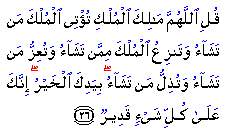The Sovereign, Housework, Peer & Apple Crisp
Issue 246 » October 31, 2003 - Ramadan 5, 1424
General
| Living the Quran | ||
Al-Imran
(The House of Imran)
This verse expresses the natural result of the oneness of God. Since there is only a single deity, He is then the only Master, "the Sovereign of all dominion" Who has no partners. He gives whatever portion He wishes of His dominion to whomever He wants of His servants. What is given becomes simply like a borrowed article. Its owner retains his absolute right of taking it back whenever he wants. No one, then, has any claim of original dominion giving him the right of absolute power. It is simply a received dominion, subject to the terms and conditions stipulated by the original Sovereign. If the recipient behaves in any way which constitutes a violation of these conditions, his action is invalid. Believers have a duty to stop him from that violation in this life. In the life to come, he will have to account for his violation of the terms stipulated by the original Sovereign. He is also the One Who exalts whom He wills and abases whom He wills. He needs no one to ratify His judgement. No one grants protection against the will of God, and no one has the power to prevent His will taking its full course. His power is absolute and His control is total. The authority of God ensures the realisation of all goodness. He exercises it with justice. When He gives dominion to anyone or takes it away from him, He does so with justice. Similarly, it is with justice that He exalts or abases any of His servants. This ensures real goodness, in all situations. Source: |
||
| Understanding the Prophet's Life | ||
Helping with housework Many men think that housework is beneath them, and some of them think that it will undermine their status and position if they help their wives with this work. Imam Ahmed reported in his Musnad, the Messenger of Allah, peace be upon him, used to “sew his own clothes, mend his own shoes and do whatever other work men do in their homes.” This was said by his wife Aisha, when she was asked about what the Messenger of Allah used to do in his house. In another narration, she said: “He was like any other human being: he would clean his clothes, milk his ewe and serve himself.” In yet another narration reported in Sahih Bukhari, a more general description of his involvement at home is available. The Mother of Believer, Aisha narrates, “He used to serve his family, then when the time for prayer came, he would go out to pray.” If we revive this example in our lives, we would at least
achieve a few things: It is commonplace nowadays to hear of men who demand food instantly from their wives when they get home. The pot might be on the stove and the baby screaming to be fed. Yet, they do not even pick up the child or show patience and wait a little while for the food. Let these ahadeeth be a reminder and a lesson for all of us. These lessons are also applicable in the case of siblings helping out each other, especially in the month of fasting. Help out your family in its preparation for Suhur and Iftar. Source: |
||
| Something Yummy! | ||
Ramadan is a time where we fast all day and where we eat our fill of fried, fatty yet oh so yummy foods at the end of the day. We thought that it would be nice to give our readers a little something yummy with half the calories of our usual treats! Pear and Apple Crisp
Directions: Nutritional Info: |
